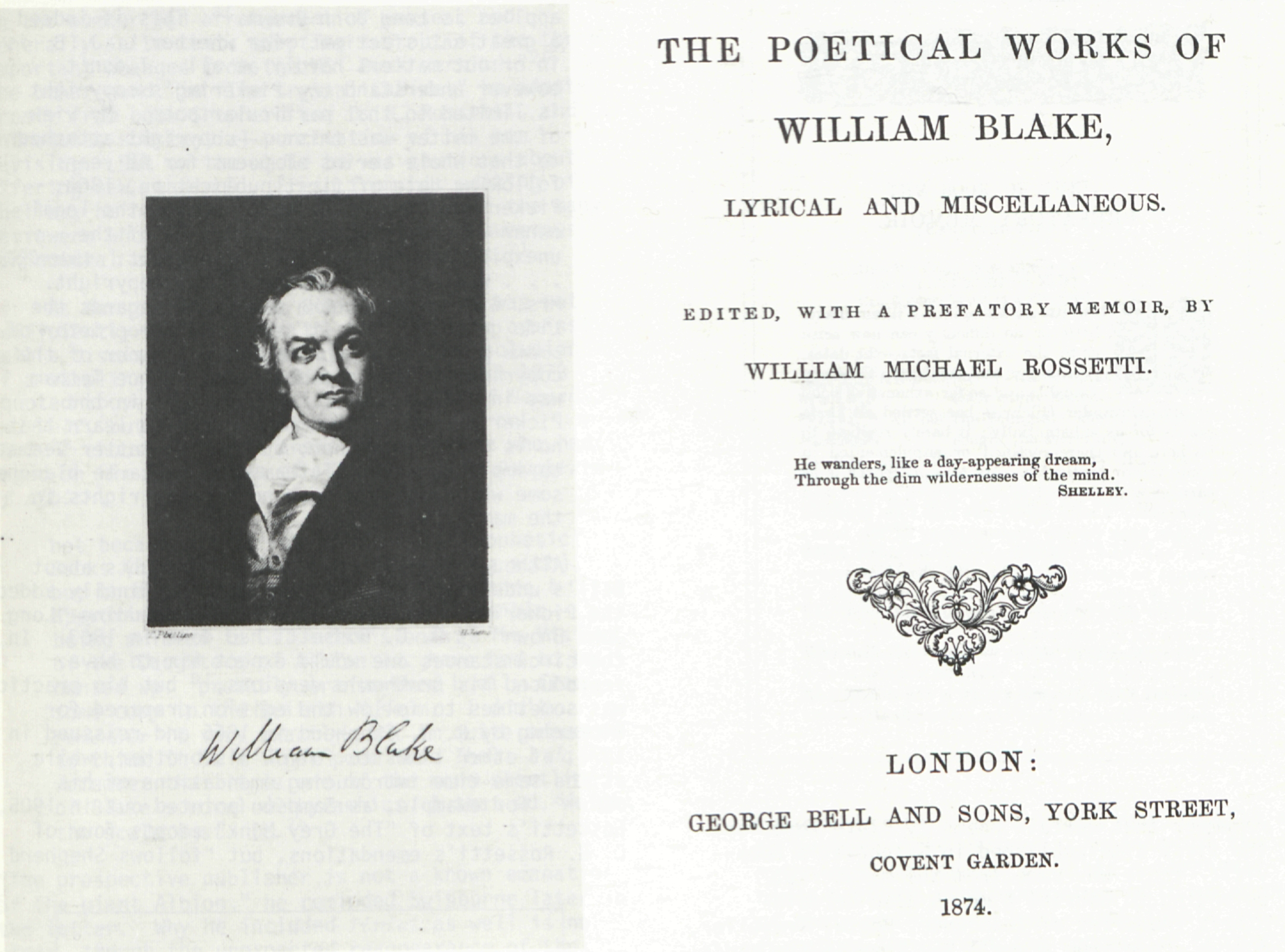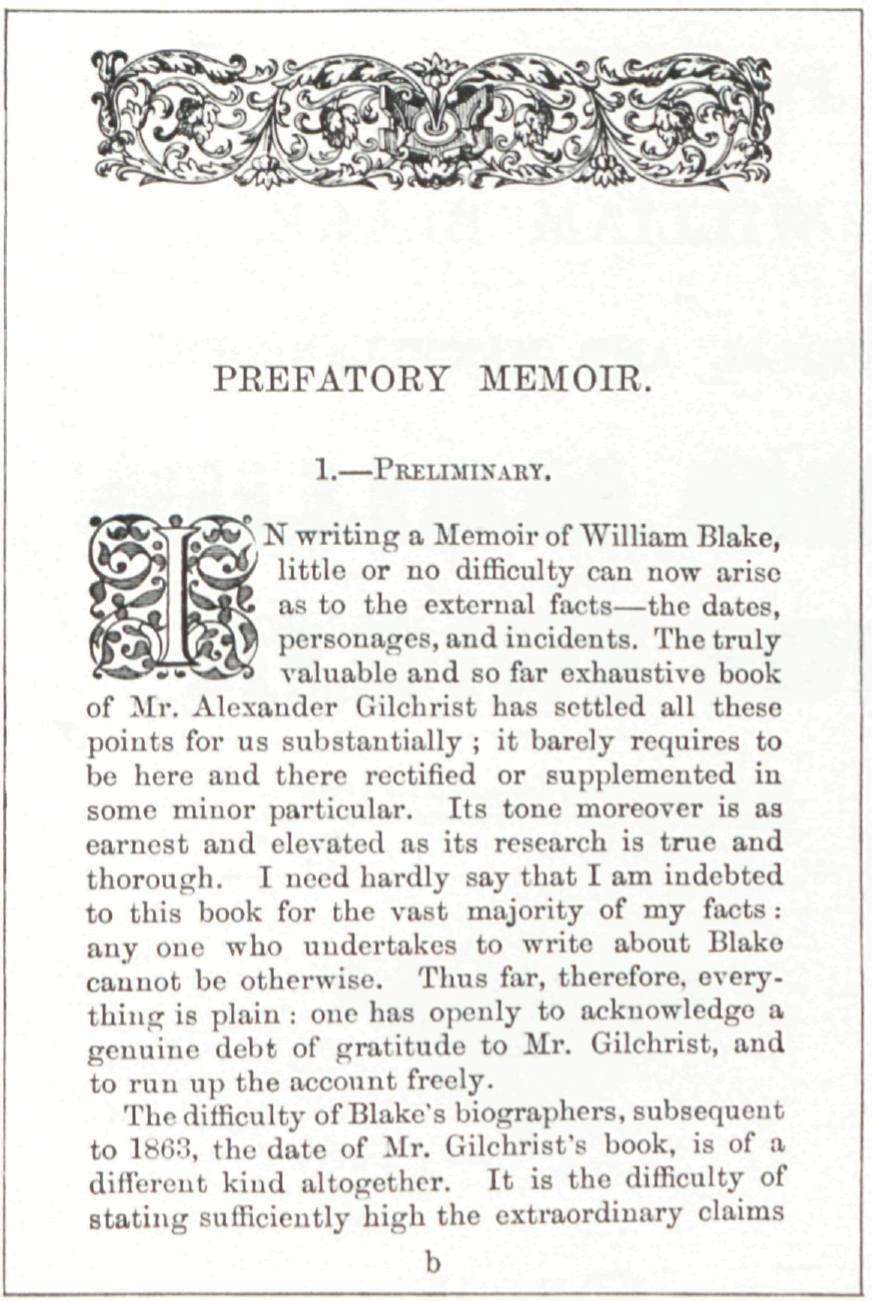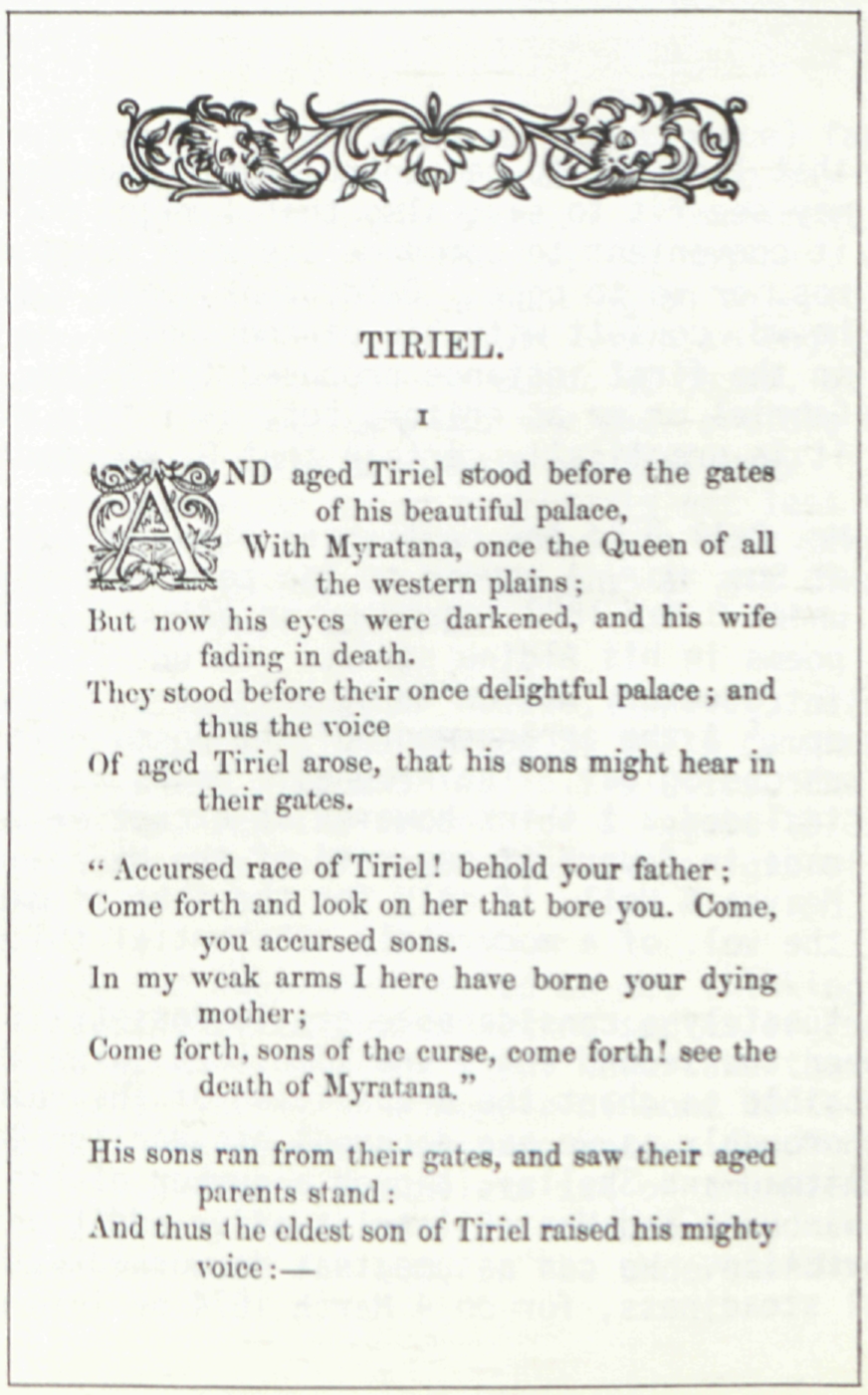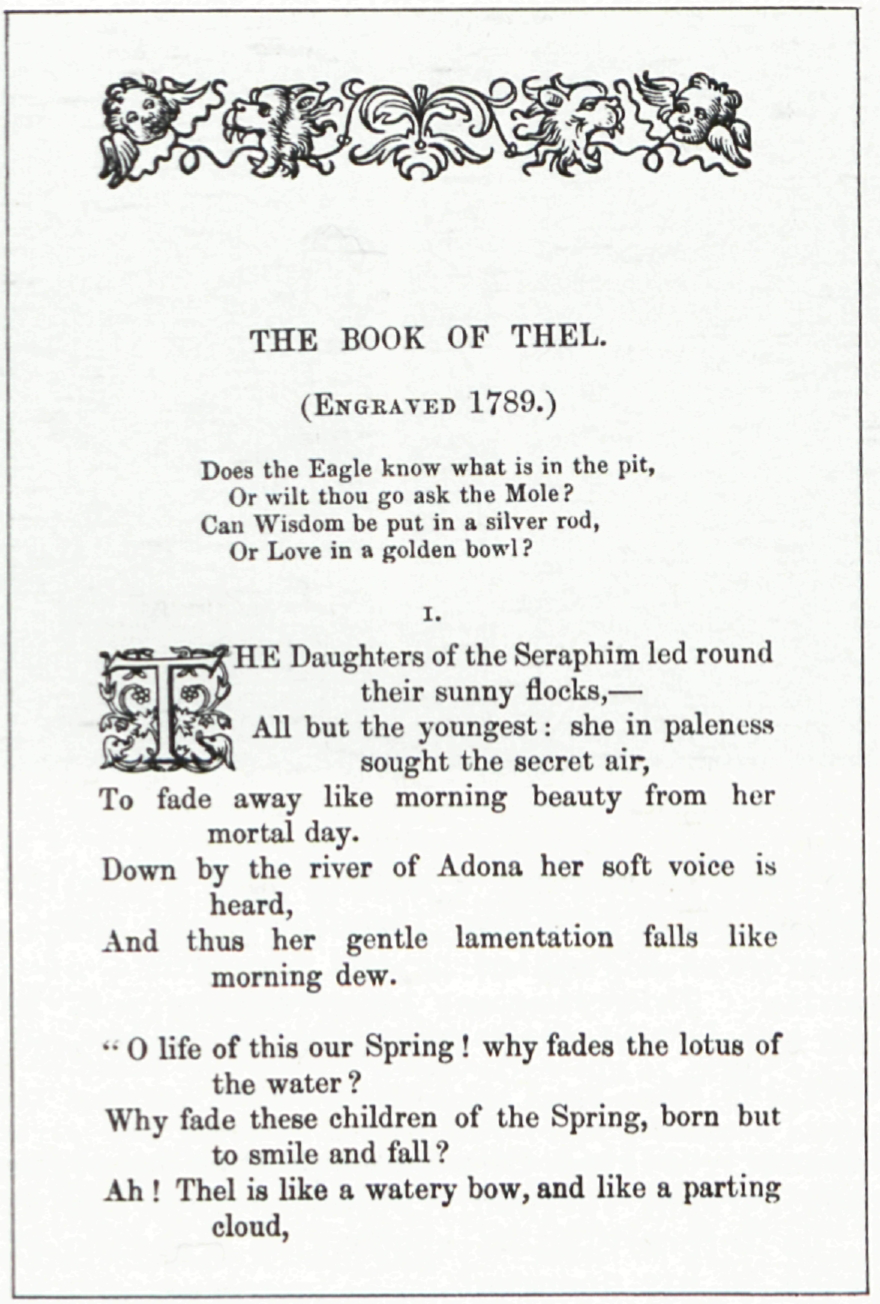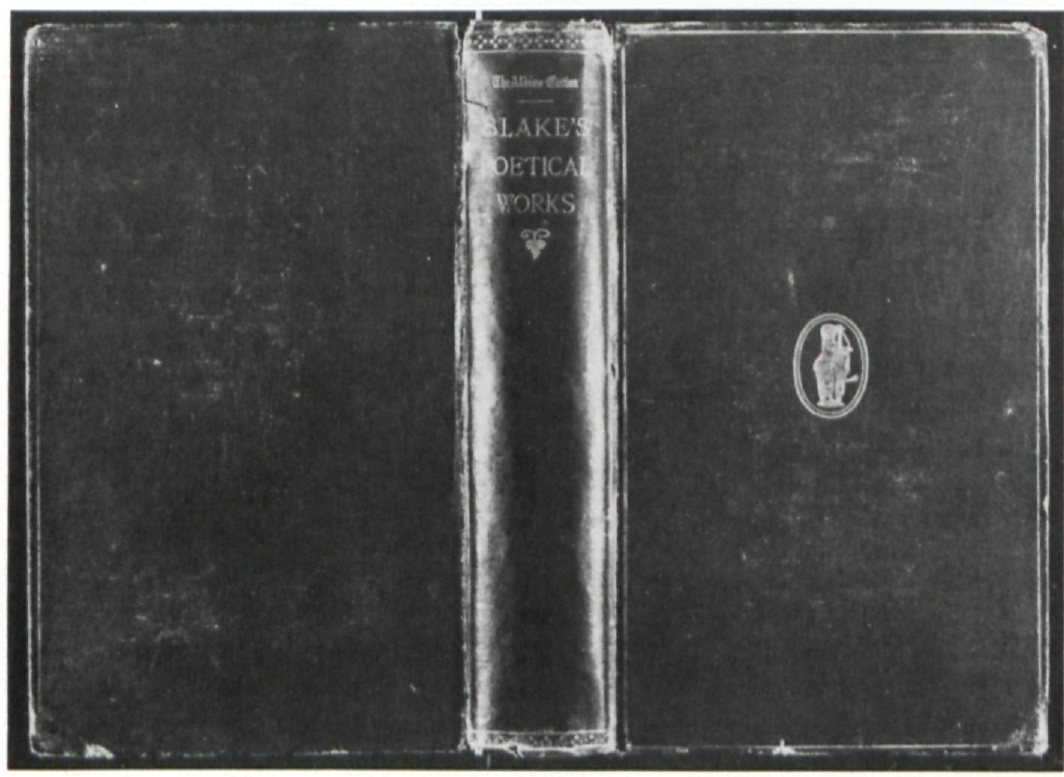article
begin page 4 | ↑ back to topWILLIAM MICHAEL ROSSETTI’S ALDINE EDITION OF BLAKE
Although William Michael Rossetti has been given his due as a major contributor to Victorian writings on Blake, a number of unpublished or unremarked details relating to the preparation, publication and reception of his edition of the Poetical Works of William Blake (1874) make his concern with Blake’s reputation worth returning to.1↤ 1 Rossetti’s part in the 1863 and 1880 editions of Gilchrist, his Aldine edition, and his miscellaneous writings on Blake are discussed in the bibliographies by Keynes, and Bentley and Nurmi, and in Deborah Dorfman, Blake in the Nineteenth Century (New Haven, 1969). Dorfman’s account of the Aldine edition is the fullest (pp. 112-14, 165-67), but it needs supplementing as provided here. Our knowledge of the preparation of Rossetti’s catalogue raisonné for Gilchrist is sketchy, but it should be possible to fill in the details as more of Rossetti’s correspondence becomes available. Of Rossetti’s miscellaneous writings on Blake, the following do not appear in the standard lists: (1) “Gilchrist’s Life of Blake,” Reader, 2 (November 1863), 544. (Corrects a statement in the Reader about his part in completing Gilchrist.) (2) Review of Selections from the Writings of Blake, with an Introductory Essay by Laurence Housman, Athenaeum, 3 June 1893, p. 700. (Identified from Rossetti’s file of the Athenaeum in the Library of the Courtauld Institute.) (3) “The William Blake Revival,” Daily Graphic, 2 November 1904, Supplement, p. 1. (Review of Russell’s Letters of Blake, Ellis’ Poetical Works of Blake, and G. Robertson’s edition of Gilchrist.) As early as 1864, in a letter to Horace Scudder, Rossetti lamented the public response to Gilchrist in a way which suggests how much more he considered needed to be done to secure Blake’s fame. Scudder had recently reviewed Gilchrist in the North American Review, and Rossetti was acknowledging a copy of the review.
↤ 2 Suzanne R. Hoover, “The Public Reception of Gilchrist’s Life of Blake,” Blake Newsletter, 8 (1974), 26-31, points out that there were at least half a dozen favorable reviews in British periodicals up to this date. ↤ 3 Houghton Library MS., Harvard University. All quotations from manuscripts are, to the best of my knowledge, published for the first time. I am indebted to Mrs. Imogen Dennis for permission to quote from the letters and diaries of her grandfather William Michael Rossetti, and to Prof. W. E. Fredeman and the University of British Columbia for permission to publish the extracts from Rossetti’s diaries (from the Angeli Papers). Permission to publish manuscripts in their Collections has also been given by the following libraries: the British Library, the Bodleian, and the Houghton.27 November 1864
My dear Sir,
I have to thank you very sincerely for your note, & the accompanying review of Blake from the North American Review. However I had already read the article; having seen it advertized & strongly suspecting—from my knowledge of what has taken place on former occasions where a little openness to new impressions was needed, & a little boldness of opinion—that the book would be better estimated in America than in England. I found my anticipation more than confirmed, & derived much pleasure from a perusal of the article. It is (if I may say so to you without impertinence) far the best I have seen; & I am sorry to say that it is not necessarily so much a compliment as I mean it to be, for the English notices, with one or two exceptions amounting to tolerable, have been silly, poor stuff which an Englishman winces & blushes at—or ought to do so, at least.2 My brother, who saw your article here yesterday, joins me in rating that very differently—as being positively not less than comparatively a worthy tribute to that very wonderful genius, the “mad-man” of his discerning countrymen, Blake.3
It was almost another decade, however, before Rossetti was offered the chance to write comprehensively on Blake. Two entries in his Diary, the first for 8 May 1872 and the second for 6 August 1873, give a reasonably full account of the origin of his edition: ↤ 4 On “The Aldine Poets,” an established series then being reissued with new names at a popular price, see Edward Bell, George Bell, Publisher (London, 1924), p. 51. ↤ 5 The Athenaeum reported on 5 July 1873, p. 17, that “The term of partnership existing between Messrs. Bell & Daldy having expired, Mr. Daldy has retired from that firm.” ↤ 6 As published the Memoir ran to 125 pp. ↤ 7 MS. Diary. Angeli Papers, Special Collections, University of British Columbia.
Daldy the Publisher called on me, thinking of including Blake in his Aldine series of Poets;4 & he asked me whether I wd. undertake the editing—including a Memoir of some 30 to 100 pages. He does not wish to insert the Prophetic Books, but only a complete set of the poems of an ordinary cast. I replied that I wd. undertake the work for £50, on the understanding begin page 5 | ↑ back to top that I am not to be controlled in anything I may see fit to say; also that I might not find it convenient to commence the work for some 6 mos. or so to come. Daldy took leave, saying he wd. consult with his partner Bell. He had in the first instance proposed for either Gabriel or me as editor; but, as I told him, it is practically certain that G. wd. decline.Unfortunately a considerable gap in Rossetti’s Diary between the second entry and late 1876 makes it impossible to chart the preparation of the volume as thoroughly as we can document his earlier editions of Whitman and Shelley, though a number of his letters to Swinburne and Mrs. Gilchrist offer additional information. We can assume that he worked with his usual steadiness, for on 4 March 1874 he informed Swinburne that “Yesterday I received the first proofs, both of the poems & of my Prefatory Memoir.”8↤ 8 B. L. Ashley MS. A1444, fol. 109v. A copy of the edition (presumably an advance copy) was in Swinburne’s hands by late October 1874,9↤ 9 Swinburne Letters, ed. C. Y. Lang (New Haven, 1959-1962), II, 348. and it was listed in “Publications of the Week” in the Spectator of 14 November 1874.10↤ 10 Spectator, p. 1439. Also noted in “List of New Books,” Athenaeum, 14 November 1874, p. 642. Both lists give the price as 5/-.
Mr. Bell,5 of the publishing firm, called on me at Som. Ho., & agreed to the terms set forth under 8 May 1872 regarding an edition of Blake’s poems in his Aldine series. He wd. like the introductory notice to be only about 32 to 48 pp.,6 & the arrangement of the poems mainly chronological. The Prophetic Books wd. not be included: I think however an exception must be made in favour at any rate of the Marriage of Heaven & Hell, if only for the sake of making the vol. of a moderately substantial thickness.7
In his correspondence with Mrs. Gilchrist and Swinburne between August 1873 and March 1874, Rossetti discussed mainly copyright matters and the inclusion of representative Prophetic Books. Initially he anticipated no difficulty over the ten poems from the manuscript book later known as the Pickering MS., nine of which D. G. Rossetti had printed in Volume II of Gilchrist. On 25 August 1873 he wrote to Mrs. Gilchrist that “B[ell] wd. probably succeed in effecting some arrangement with M[acmillan] & P[ickering] enabling B. to reproduce the poems,” though four days later he admitted that “the matter appears to be a little complicated.”11↤ 11 Letters of William Michael Rossetti to Anne Gilchrist, ed. C. Gohdes and P. F. Baum (Durham, N. C., 1934), pp. 87, 89. By 27 February 1874 he had reason to complain to Swinburne about “a provoking claim of copyright,” and his fear that he might have to “miss out” the poems, “thus spoiling the edition.”12↤ 12 B. L. Ashley MS. 1446, fol. 91. In another letter to Swinburne of 4 March 1874 he reported as follows: ↤ 13 Cf. the account of provenance given by G. E. Bentley, Jr., in The Blake Collection of Mrs. Landon K. Thorne (New York, 1971), pp. 42-43. ↤ 14 B. L. Ashley MS. A1444, foll. 109v-110v.
The copyright difficulty—of wh. I foresaw something from the first—is this. You begin page 6 | ↑ back to top remember that certain poems by Blake were for the first time published in Gilchrist’s book—viz.: those wh. came from the manuscript belonging to Gabriel & me, & also certain others (Auguries of Innocence, Mental Traveller, &c) wh. came from a small MS. then in the hands of Mrs. Gilchrist. The poems from this small MS. are someone’s copyright for 42 years from date of first publication (1863), just as the poems from Gabriel’s & my manuscript are our copyright. It turns out that the small book was claimed by and returned to Tatham, who sold it to Harvey (bookseller), who sold it to Pickering;13 & the latter republished these poems in or about 1865, along with the Innocence & Experience. Thus Pickering is the present owner of this copyright; & he, not liking Bell, nor relishing a further republication of the poems, declines to authorize reissue. This is very annoying. Bell did tell me a fortnight or so ago that he understands Dr. Wilkinson is in possession of a certain Blake MS. containing perhaps these same poems, or most of them, & that Wilkinson would allow their republication from this other MS. Of this I have as yet heard no more, & fear it will prove fallacious.14Wilkinson’s manuscript did not materialize,15↤ 15 “It seems Wilkinson has not got those rumoured Blake poems: but he has referred Bell to a lady who is supposed to possess something of the kind.” Rossetti to Swinburne, 9 March [1874]. B. L. Ashley MS. 1446, foll. 93-93v. but Rossetti was able to confide to Swinburne on 9 March 1874 that further probing by Bell had established an interpretation of the ownership of copyright favorable to his edition: ↤ 16 It applied also to “Song by a Shepherd” and “Song by an Old Shepherd,” published for the first time in R. H. Shepherd’s 1874 edition. Rossetti excluded both from his edition. ↤ 17 B. L. Ashley MS. 1446, foll. 93-94.
Bell told me the other day . . . that the only poem to wh. Pickering’s copyright really applies is Long John Brown.16 This is indeed a great satisfaction: for whether L. J. B. is in or out matters hardly at all. I don’t however understand why Pickering’s copyright is limited to that particular poem. My view of the matter was this: —copyright attached to that whole series of poems for 42 years following date of first publication, 1863: Pickering, at a later date, became the legal owner of the poems, and therefore of the unexpired residue of their copyright. Macmillan . . . was never the owner of the copyright. Mrs. Gilchrist was the owner, as regards the Life generally: & it seems each proprietor of poems previously unpublished was owner of the copyright in those same poems. Hence Tatham was in 1863 owner of the copyright in the Pickering poems. I am surprised to learn that he is still the owner; but Bell’s letter seems to imply as much. Tatham gave me carte blanche some while ago, in case he had any rights in the matter.17
Although Rossetti obviously had doubts about Bell’s understanding of the matter, he finally added the Pickering poems to his edition, excluding “Long John Brown” as D. G. Rossetti had done in 1863. In the circumstances one would expect him to have reproduced his brother’s versions,18↤ 18 In early October 1874 he was still discussing the matter of text with D. G. Rossetti, who suggested: “About the Auguries of Innocence etc., it strikes me that a verbatim version of the former, at any rate, appeared in Swinburne’s Blake—did it not? and might in that case be reprinted by Bell & Daldy if you wish.” (Letters of Dante Gabriel Rossetti, ed. O. Doughty and J. R. Wahl (Oxford, 1965-1967), III, 1314.) William’s review of Shepherd’s 1874 edition, Pickering’s fly-sheet attacking the editing of the poems in Gilchrist, and Rossetti’s reply in the Academy (see Dorfman, pp. 112-13), all of which appeared between 5 September and 10 October 1874, undoubtedly delayed Rossetti’s decision about adopting readings from Shepherd’s text. but his practice was sometimes to follow the edition prepared for Pickering by R. H. Shepherd in 1866 and reissued in 1874, at other times to follow his brother, while at the same time introducing emendations of his own.19↤ 19 Cf. G. Keynes’ statement (A Blake Bibliography (New York, 1921), p. 271) that in the poems from the Pickering MS. Rossetti “generally” followed D. G. Rossetti. Keynes correctly notes that Rossetti’s text of the Poetical Sketches “is derived from Shepherd’s edition of 1868 . . . and is very accurate,” whereas in the case of the Songs of Innocence and of Experience and of the poems from the Rossetti MS. he “followed the very inaccurate version given by D. G. Rossetti in Gilchrist.” For example, as Sampson pointed out in 1905, Rossetti’s text of “The Grey Monk” adopts four of D. G. Rossetti’s emendations, but “follows Shepherd
begin page 7 | ↑ back to top in the number and arrangement of verses, and generally as to text, adopting two out of the three important changes from the MS. Book version.”20↤ 20 The Poetical Works of William Blake, ed. J. Sampson (Oxford, 1905), p. 284. On the other hand, in “The Crystal Cabinet” he adopts freely from both Shepherd and D. G. Rossetti, and introduces substantial punctuation of his own devising. But on the whole he was cautious about offering new readings. Fresh from his editing of Shelley, he had no wish to encounter again the many reviewers who had taken exception to his numerous conjectural emendations of Shelley’s poems.21↤ 21 Chief among them was Robert Buchanan in the Athenaeum for 29 January 1870, pp. 154-56.As for the Prophetic Books, Rossetti was not sufficiently enthusiastic to champion them against Bell’s dismissal beyond arguing for the inclusion of a sampling.22↤ 22 During the 1860’s Rossetti’s attitude towards the Prophetic Books, if not overly sympathetic, was at least open. On 22 May 1862 Mrs. Gilchrist requested from him “brief general” descriptions of The Marriage of Heaven and Hell, The Book of Ahania, The Song of Los, Asia, and Africa. (Rossetti Papers, ed. W. M. Rossetti (London, 1903), p. 6.) Perhaps it is to these that Rossetti refers in an unpublished passage of his Reminiscences (Bodley MS. Eng. Misc. d. 332, fol. 213) where he records that remarks by him of a critical bearing were embodied in Gilchrist’s Life. That Mrs. Gilchrist’s list was extended is suggested by a surviving note on Visions of the Daughters of Albion, which Mrs. Gilchrist “reduced,” certain that Macmillan would reject it, though she considered it “most vigorous and admirable.” (H. H. Gilchrist, Anne Gilchrist, Her Life and Writings (London, 1887), pp. 127-28, where the original note is printed. She in fact rewrote it, replacing Rossetti’s direct exposition with the statement that “Formidable moral questions are opened up through the medium of this allegory. . . . But we will not enter on them here.” (Life of Blake (London, 1863), p. 108.) Even this statement was omitted from the second edition of 1880.) It is worth mentioning as well Rossetti’s lengthy exposition of “The Mental Traveller,” printed in Gilchrist, as evidence of his willingness to tackle a difficult text; and his constant support for Swinburne’s Blake, of which he wrote to the poet on 2 January [1866] after reading the manuscript: “I should consider its publication the greatest service at present possible to Blake, & hardly inferior to a full critical edition of his writings.” (B. L. Ashley MS. 1446, fol. 2v.) In his Diary for 6 August 1873 (quoted above) he mentions The Marriage of Heaven and Hell, but by 23 August he had decided on Thel,23↤ 23 Letters to Anne Gilchrist, p. 85. choosing it, he answered Swinburne who had urged on him the claims of Visions of the Daughters of Albion, ↤ 24 7 March [1874]. B. L. Ashley MS. 1446, foll. 92-92v.
not because it is the best of the Prophetic Books (of course it is far from being such), but because it is short, lyrical in tone & approximately in form, & easily accesible—being printed in Gilchrist’s book. The Visions of the Daughters of Albion wd. have had to be hunted up: probably transcribed bodily from some copy in the British Museum. I don’t remember it very exactly, but am quite prepared to think it is a finer poem than Thel: I do remember that it is one of the more startling of Blake’s moral dithyrambics, & that wd. weight the scale agst. it.24“The prospective publisher is not a known emanation of the giant Albion,” he reminded Swinburne later in the letter. Why he included Tiriel as well is not clear, though the unexpected reappearance of the manuscript was the most likely reason.25↤ 25 Poetical Works of William Blake, ed. W. M. Rossetti (London, 1874), p. cxxiii. When Swinburne, in acknowledging Rossetti’s edition, regretted its “public appearance,” Rossetti merely replied that he was “Sorry you are so adverse to Tiriel—wh. I for my part think fully entitled to its place in the book.”26↤ 26 4 November [1874]. B. L. Ashley MS. 1446, fol. 96.
At the same time, it should be noted that however ambivalent Rossetti’s attitude towards the Prophetic Books was, he favored publication of a letterpress edition. Their exclusion from the Aldine edition, he insisted to Swinburne, “wd. not have been my voluntary choice,” and he again excused that “it was obviously the only course likely to be adopted by a Publisher.”27↤ 27 4 March [1874]. B. L. Ashley MS. A1444, fol. 109v. In the Memoir prefixed to the edition he explicitly called for publication, arguing that “Blake will be but imperfectly known even to his enthusiasts until this is done.”28↤ 28 Poetical Works, p. cxxix. Four years later, in a review in the Academy of the facsimile edition of Jerusalem published by Pearson in 1877, he pleaded at length: ↤ 29 Academy, 13 (1878), 174.
We cannot omit the present opportunity of saying that the publication in ordinary book-form, without designs, and without any attempt at facsimile of text, of the Jerusalem and other Prophetic Books, is highly to be desired. Difficult under any circumstances, it would be a good deal less difficult to read these works in an edition of that kind, with clear print, reasonable division of lines, and the like aids to business-like perusal. An index of the mythologic personages of Blake’s strangely-named pantheon or pandemonium, with an account of their various and semi-intelligible performances throughout the successive Prophetic Books, would also be a powerful aid to such understanding of the subject as is, in the nature of things, possible. No doubt the compilation of such an index would be rather like attempting to draw a nightmare to scale: but something or other in that direction could undoubtedly be accomplished, with patience and goodwill for the work.29About the possibility of approaching total explication he remained skeptical. In an unpublished passage of his autobiography, written between 1901 and 1903, he observed: ↤ 30 “Some Reminiscences.” Bodley MS. Eng. Misc. d. 331, fol. 214. Two visits, one from Yeats and one from Yeats and Ellis, are recorded in Rossetti’s Diary (Special Collections, University of British Columbia): 11 September 1890, “Yeats the young Irish Poet (to whom I was introduced some while ago at a Shelley meeting) left a card the other day noting that he wd. like to speak to me on some Blake matters, as he is now writing on that subject. I explained that we are in the confusion of moving, & suggested that he might perhaps as well call at Somer. Ho. He did so today, & we had a longish talk. He is certainly a very acute & bright-minded young man. He & one of the Ellis (Philological) family are engaged in producing a complete edition of B’s Prophetical Books &c., with comment expounding his philosophical or speculative system—wh. Y. regards as being founded very mainly on Boehme. This matter was glanced at in an article by York Powell (I was reading it the other evg.), introductory to the “Book of Los” lately discovered. Tho’ I have not as yet been disposed to regard B’s Jerusalem &c. as capable of more than a moderate amount of reasoned explanation, I see, from what Y. says, that there is a good deal to be adduced & expounded from his point of view. What he more particuly. wanted from me was to trace out the Book of Ahania, & The French Revolution. He says they are not in the British Museum. My impression is that that is where I read them (in 1862): I shall probably, as I look into the matter, be able to give Y. some little further informn. as to details. I referred Y. to that passage in my Memoir of B. in wh. I indicate the affiliation of his theology to that of Marcion: Y. seems as yet not to have fixed his attention on this passage, but he will now give some practical study to the question.” 13 April 1891, “Yeats, & his colleague in the project of reediting Blake . . . called on me at Somers. Ho. Their undertaking has now reached an advanced stage. They showed me one of the Prophetic Books reprinted in a quasi-facsimile. I think—& told them so—that I regard this as a decided mistake. One cannot read with any comfort a book in any such sort of fancy-type: besides the cost of the edition, both to projectors and to purchasers must thus become beyond all bounds of reason.” Yeats later wrote of Rossetti, apropos of his opinion of the Prophetic Books, that he was “a man of exceptional ability and high literary standing, who happens not to be in sympathy with Blake’s method of writing.” The Works of William Blake, ed. E. J. Ellis and W. B. Yeats (London, 1893), I, 54-55.
I know most of what has been written about Blake, but have not investigated the elaborate study of his works by Messrs. Ellis & Yeats in their edition of a few years ago. I had a little speech with them on this subject, & learned that they regarded Blake’s religious or quasi-religious utterances, usually counted to be chaotic, as cosmical in essence, & in detail interpretable. I presume that this view is to some valid extent justified by their commentary; yet cannot bring myself to think that Blake was in these matters a constructive thinker or an orderly expositor. My impression continues as heretofore—that, while he was a great genius in two arts, there was also a maniacal side to his intellect. Needless to begin page 8 | ↑ back to top say that he was not a madman pure & simple: but he was a creative inventor whose ideas & utterances struggled beyond the limits of sanity. This view may be erroneous: it is the one to which my studies of Blake’s works have led me.30That Rossetti deleted this passage when he prepared his autobiography for publication in 1906 could, of course, be interpreted as suggesting a waning of confidence in his judgment.
To the reviewers of the Aldine edition in 1874-1875, Rossetti’s kind of cautious assessment was (in a word applied to the Memoir by most of them) “sound.” Edmund Gosse’s two-part review in the Examiner 31↤ 31 14, 21 November 1874, pp. 1243-44, 1270-71. offers the most pronounced indication of critical opinion of Blake in the 1870s. Gosse, a friend both of the Rossettis and of Swinburne, declared that there was a danger “that, after so long a time of disgrace and oblivion, the reaction may be too violent, and the enthusiasm over the newfound wonder be blind and altogether excessive.” He confessed that “some such fear as this was in our mind when we began Mr. Rossetti’s long, learned, and most interesting memoir; and, though we are of the opinion that in one or two cases his admiration for his subject has led him beyond what the canons of pure criticism permit, we are bound in justice to say that, as a whole, his memoir is as remarkable for clear judgment and good sense as it is for enthusiasm.” At the same time Gosse was sharply critical of Rossetti’s urging of the publication of the Prophetic Books: “He seems to us to propose one of the most hopeless and ill-advised experiments that the publishing world has ever seen.” A similar criticism came from John Dennis in the Spectator. 32↤ 32 2 January 1875, pp. 14-16. I am indebted to my colleague, Dr. R. H. Tener, for identifying the reviewer from his transcript of the Spectator records. Dennis expressed surprise that, considering Rossetti’s opinion that the Prophetic Books “are neither readable nor even entirely sane” (Dennis’ words), he should consider it desirable that they be published: “We disagree with him altogether. Blake wrote a great deal of what, had it been the work of a smaller man, would be accounted trash, and the sooner it is forgotten the better for his fame. We venture indeed to think that Mr. Rossetti would have done wisely to omit a good deal contained in this small volume, since there are passages here as free almost from mind and meaning as any combination of words could well be.” Only George Saintsbury in the Academy 33↤ 33 6 (5 December 1874), 599-601. supported publication: “The sooner it is done the better.” Yet even Saintsbury was of the opinion that on Blake’s madness Rossetti’s “conclusions might have been safely stated with much less qualification, that Blake was most undoubtedly mad, unless the meaning of words is to be strangely perverted.” Much the same point was made, less sympathetically, by Coventry Patmore in the St. James’s Gazette: “Mr. W. Rossetti . . . goes a great way further in his admiration of Blake than reason can be shown for.”34↤ 34 Reprinted in Principles in Art (London, 1907), p. 94. What these reviews amply demonstrate (and other reviews in such papers as the Daily News and the Sunday Times closely echo them)35↤ 35 Daily News, 5 December 1874, p. 2; Sunday Times, 22 November 1874, p. 7. A neglected four-part review by G. W. Foote, the atheist who was tried for blasphemy in 1883, appeared in the National Reformer, N.S. 25 (14, 21, 28 February, 21 March 1875), 100-01, 115-16, 131-32, 181-82. Foote observed that after his “generous vindication of the rising genius of Swinburne” and his edition of Whitman, Rossetti had turned appropriately to Blake, a poet “as audacious even as Whitman.” is that the publishers were clearly right in thinking that the Prophetic Books did not yet have a place in a “popular” edition of Blake’s poems, and just as clearly, that Rossetti’s qualified assessment of Blake’s genius, however tame and wrong-headed it would in time appear, was in 1874 somewhat in advance of the times. The real value of Rossetti’s edition, as Saintsbury remarked, consisted in the “increased facilities” it offered for studying a significant portion of Blake’s poetry, and of assessing its “certain excellences.” This value it retained until its place was taken by the Yeats-Ellis edition of 1893, and, more effectively, by Sampson’s one-volume edition of 1905.36↤ 36 Since the records of G. Bell & Sons are unavailable, it is impossible to know how often the volume was reprinted. I have examined the following reprints: 1875, 1879, 1882, 1883, 1885, 1888, May 1890, October 1890, 1891, 1893, 1913, 1914 (“Bohn’s Popular Library,” with the addition of the three Pickering copyright pieces mentioned above). Bentley and Nurmi note reprints of 1890 and 1911.

